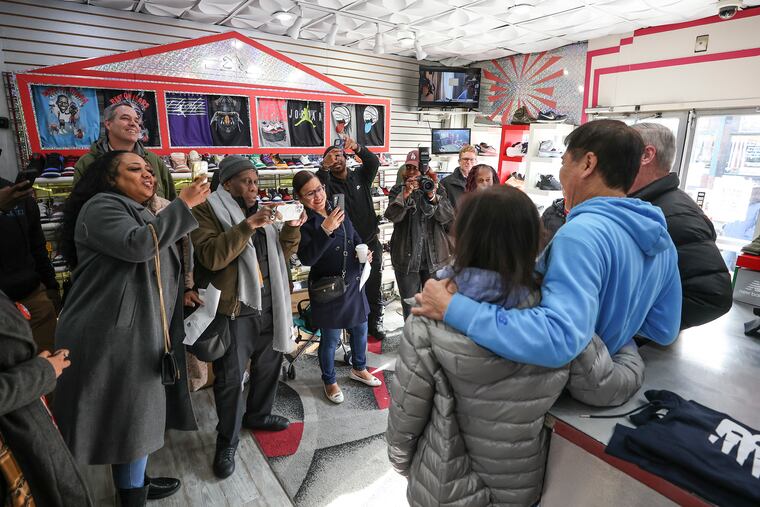A staple of North Philly’s sneaker scene is sentenced to probation for $4 million tax evasion scheme
"I know I made a great mistake," said Yong Lee, owner of Young's Sneaker City on West Girard Avenue, during his sentencing hearing in federal court.

A fixture of North Philadelphia’s sneaker scene who pleaded guilty earlier this year to hiding more than $4 million in sales from the IRS was spared prison time this week by a federal judge who credited the man’s decades-long commitment to his community.
Instead, U.S. District Judge Milton Younge sentenced Yong Lee, owner of Young’s Sneaker City on Girard Avenue, to five years’ probation and imposed a $55,000 fine. In addition, Lee was ordered to pay more than $493,000 in back taxes to the IRS — a sum the shoe salesman’s lawyer said Thursday he’d already delivered.
“I know I made a great mistake,” Lee, 63, of Dresher, told the judge during his sentencing hearing in federal court. “But what I can say to you, your honor, is I’m going to become honest and respect the law from now on until the day I die.”
After the nearly two-hour hearing in which several of Lee’s customers, friends, and family members extolled his decades of dedication to a largely low-income and Black clientele, the judge concluded the sneaker salesman was worthy of leniency.
Several of them described Young’s Sneaker City as a bright spot on its stretch of West Girard, on the edge of Brewerytown.
Lee opened the shop in the mid-‘80s after immigrating to Philadelphia from South Korea with his family in 1974. And the store, where he works with his wife and twin sons, quickly became a staple among families looking to outfit their children and with avid North Philadelphia sneakerheads on the hunt for the latest fashionable kicks.
Its Instagram account, which has attracted more than 30,000 followers, features photos of loyal customers browsing its extensive collection of New Balance and Nike tennis shoes or just hanging out in the store.
Several witnesses told the court of Lee’s efforts to earn the acceptance of the community — whether by providing free turkeys to families on Thanksgiving or shoes to local schools for Christmas. He kept photos of customers who’d died in acts of violence on the walls of his store and made time to attend their funerals.
“He’s stood by that community for decades,” friend Mark O’Donnell told the court. “He’s employed local teens and people of color. The community is loyal to him. They come back generation after generation [to] bring their children to that store and let that humble man put shoes on their little kids’ feet.”
Patron’s loyalty to Lee ran so deep that when looting broke out across many pockets of the city during the May 2020 racial injustice protests spurred by the police killing of George Floyd, they guarded his store’s entrance to protect it.
“As an immigrant from East Asia, it is not easy to get support and empathy from that neighborhood,” Lee told the judge Thursday, speaking through a Korean interpreter. “Many times, I have been [robbed], and my store has been broken into. But as time went by my neighborhood people treated me as one of their family.”
And yet, prosecutors insisted Lee had earned some form of punishment for his crimes. He pleaded guilty in March to four counts of tax evasion and admitted he’d failed to report many of the store’s cash sales on his corporate and personal income taxes.
Instead, they said, he’d used the money he owed the IRS to buy groceries and pay household bills. He spent $730,000 of the funds to buy homes for his sons in Montgomery County.
“He was a businessman for many years,” Assistant U.S. Attorney Frank Weber said. “He knew he had to pay taxes on the money his business made. He couldn’t just take the cash out of the cash register and spend it anyway he wanted.”
Weber acknowledged that when confronted by investigators, Lee confessed almost immediately and even helped IRS agents investigate his crimes by providing a “pretty expertly done” accounting of the money he’d failed to report.
And Younge credited that choice as he announced his decision to spare Lee from prison. The judge acknowledged that the probationary sentence he ultimately imposed marked a significant break from federal guidelines that called for Lee to be imprisoned from anywhere from a year to 18 months.
Still, he sent Lee off with a warning.
“This is the best [outcome] that can possibly be,” Younge said. “It will never be this good again.”